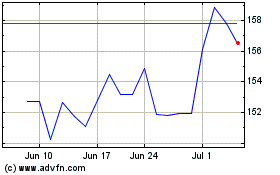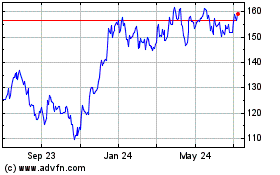How The Rich Are Different:Recession Hits Investment Psyche
November 18 2009 - 1:52PM
Dow Jones News
The rich are different than you or me, and it turns out that the
ultrarich are different than the mere well-to-do, according to a
survey that asked wealthy investors about the effects of the
recession on their portfolios and prospects.
PNC Wealth Management polled 1,046 adults with annual incomes of
$150,000 or above, at least $500,000 of investable assets or, if
retired, at least $1 million of investable assets in September. PNC
Wealth Management is part of PNC Financial Services Group Inc.
(PNC).
Nearly 70% of investors with between $500,000 and $1 million in
investable assets said the effect was negative; a sentiment shared
by only half of those with more than $5 million to invest - a group
PNC defines as ultra-high-net-worth for the purposes of its
survey.
At the same time, these ultra-high-net-worth investors were less
optimistic about stock-market returns through the next half year,
and more pessimistic about the chance of an economic recovery in
2010.
The impact of the recession may well have been worse for
mass-affluent investors than for those with $5 million or more. For
one thing, they are likelier to have gone it into with more broadly
diversified portfolios in aid of a financial plan geared to meet
concrete life goals, according to Thomas Melcher, head of PNC
Wealth Management's multifamily office, Hawthorn.
"The ultrawealthy were more conservatively positioned entering
the financial crisis," says Melcher. And that, he adds, is because
they were likelier than investors further down the wealth scale to
have been served by wealth managers who recognized that, a few
flush years in the middle of the decade aside, markets have been
choppy since the tech bubble burst in 2000.
And Melcher says the greater pessimism about an economic
recovery among $5 million-plus investors makes sense in light of
national policy debates.
"The government has spent an awful lot of money to keep the
economy on track, and the debates we're hearing about are all about
health care and taxes and the budget, and so, if you happen to be
high on the socioeconomic scale in this country, you're looking at
a significant part of the bill for all this coming to you."
Hawthorn manages $16 billion for about 600 families.
- By Thomas Coyle, Dow Jones Newswires; 212-416-2245
PNC Financial Services (NYSE:PNC)
Historical Stock Chart
From Oct 2024 to Nov 2024

PNC Financial Services (NYSE:PNC)
Historical Stock Chart
From Nov 2023 to Nov 2024
